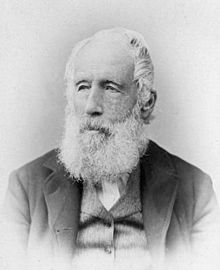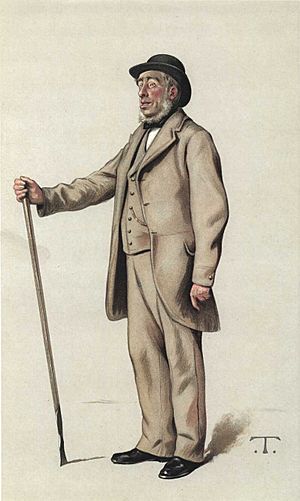John Bennet Lawes facts for kids
Quick facts for kids
Sir John Bennet Lawes, Bt
|
|
|---|---|
 |
|
| Born | 28 December 1814 Harpenden, Hertfordshire, England
|
| Died | 31 August 1900 (aged 85) |
| Awards | Albert Medal (1893) |
Sir John Bennet Lawes (1814–1900) was an important English scientist and businessman. He is famous for his work in agriculture. He started an experimental farm at his home, Rothamsted Manor. There, he invented a special plant food called superphosphate. This invention was a big step and helped create the modern chemical fertilizer industry.
Contents
Early Life and Education
John Bennet Lawes was born on December 28, 1814, in Rothamsted, England. His family owned the Rothamsted estate. John's father passed away when he was only eight years old. His mother, Marianne, mostly raised him.
He went to school at Eton College and then to Brasenose College, Oxford. However, he left Oxford before finishing his degree. In 1832, he inherited the Rothamsted estate.
Scientific Discoveries
Even before leaving Oxford, Lawes became very interested in plants. He started growing different medicinal plants on his estate. He also began experimenting with how different types of animal waste affected plants in pots. A few years later, he expanded his experiments to crops in the fields. His goal was to help farmers grow more food without relying only on animal waste for fertilizer.
In 1842, Lawes made a huge breakthrough. He patented a new type of plant food. He made it by treating phosphates with a strong acid called sulphuric acid. This invention was the start of the artificial fertilizer industry.
The next year, he teamed up with another scientist, Joseph Henry Gilbert. They worked together for over 50 years. They did many experiments on growing crops and feeding animals. Their work at Rothamsted became very famous among scientists who studied agriculture.
Awards and Recognition
Lawes's important work earned him many honors. In 1854, he was chosen as a member of the Royal Society. This is a very old and respected scientific group. In 1867, the Royal Society gave Lawes and Gilbert a special award called the Royal Medal.
In 1882, John Bennet Lawes was given the title of baronet. This meant he became "Sir John Bennet Lawes." In 1883, he was also made a member of the American Philosophical Society.
Later Life and Passing
Sir John Bennet Lawes passed away on August 31, 1900, at the age of 85. His son, Charles, inherited Rothamsted Manor and the estate. Sir John was buried with his wife, Caroline, in the churchyard of St Nicholas Church, Harpenden. Caroline had passed away five years earlier.
Lasting Impact
Sir John Bennet Lawes wanted his important work to continue. In 1889, he set aside money to make sure the Rothamsted experimental farm would keep going. This led to the creation of The Lawes Agricultural Trust. Today, the Rothamsted Experimental Station is the oldest agricultural research center in the world. It continues to do important work in farming science.
A school in Harpenden, England, is named after him: Sir John Lawes School. Also, a place in Australia called Lawes, Queensland is named in his honor. This area is home to the University of Queensland Gatton Campus, which focuses on agriculture.
Images for kids
 | Dorothy Vaughan |
 | Charles Henry Turner |
 | Hildrus Poindexter |
 | Henry Cecil McBay |



